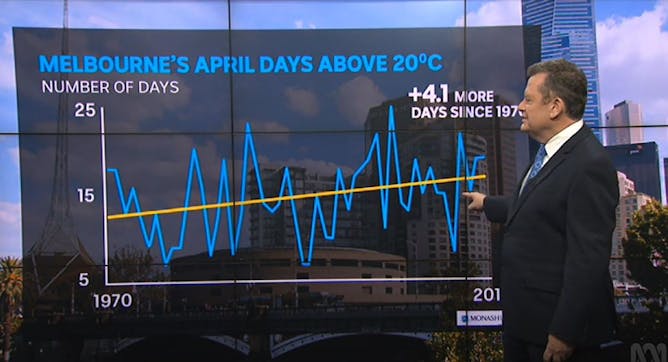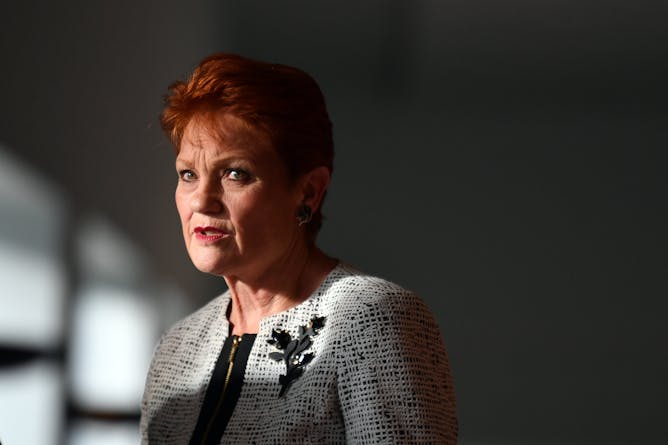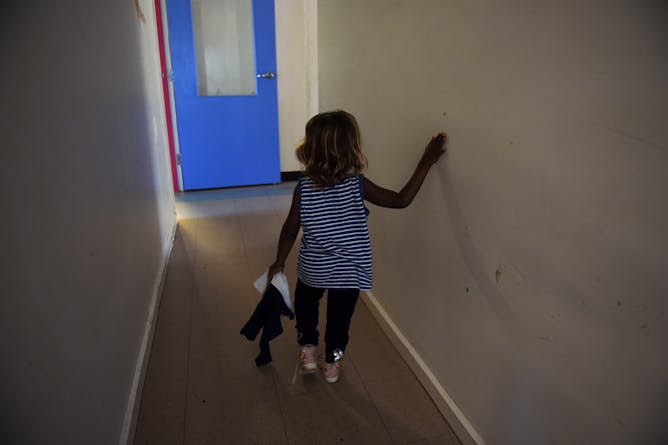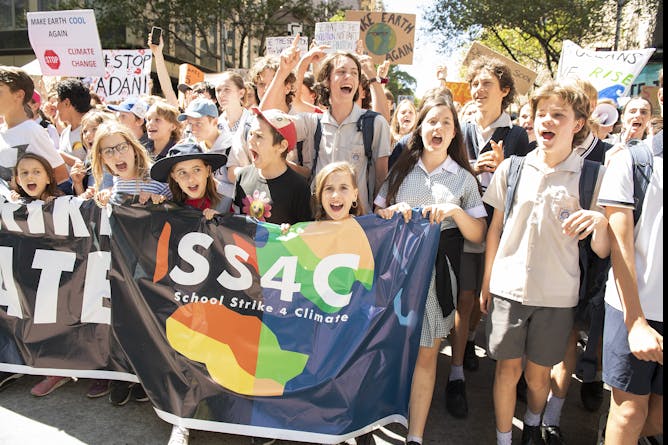|
|
|
Editor's note
|
|
Politicians are forthright about their views on climate change, but does the public really care what they think? Research has shown that, by and large, the answer is no. We want to hear about climate change from farmers, firefighters, scientists and, critically, weather presenters.
That familiar face on your TV news is not just a trusted source of information, they reach a huge audience. If we want to get the public thinking about climate change and how it affects their daily lives, how better than via the nightly TV weather spot?
A Monash University project is encouraging just that. It has engaged weather presenters to include climate information, such as trend graphs, in more than one-third of Australia’s media markets across three major networks.
Writing in The Conversation today, the project’s leader, David Holmes, says this contribution of weather presenters to public discussion will, hopefully, prompt viewers to think more about the climate crisis and how best to respond.
The piece forms part of our final day of coverage for the Covering Climate Now initiative - an alliance between 250 news outlets around the world to give sustained attention to global warming ahead of a critical UN summit on Monday September 23. This week we brought you powerful writing by renowned scientist Tim Flannery on why he considers his last 20 years of climate activism to be a “colossal failure”. We took stock of Australia’s progress towards international climate goals and identified [which nations are leading the world on emisisons reduction],
(https://theconversation.com/the-good-the-bad-and-the-ugly-the-nations-leading-and-failing-on-climate-action-123581) and which are dragging the chain.
Two researchers wrote of their grief, and hope at the Great Barrier Reef’s dire outlook. We explored how rising temperatures [affect our health], (https://theconversation.com/how-rising-temperatures-affect-our-health-123016) how best to move communities threatened by climate change, what schools are teaching kids about the climate emergency, and why we should attend events such as today’s global climate strike.
This week, The Conversation also took a fresh public stand against climate skeptics who derail public debate by spreading misinformation. Editor Misha Ketchell announced we would refocus our efforts on weeding out the misinformation spread by climate science deniers by deleting their comments from our site. The move was widely applauded on social media and elsewhere. But it drew outrage from some, including Tasmanian Liberal senator Eric
Abetz, who compared our zero-tolerance approach to the Nazi regime.
However The Conversation will not be deterred. We remain committed to producing free, evidence-based information to help the public understand the world’s most complex issues. This is vital to democracy, and, in the case of the climate emergency, to the health of our planet.
|
Nicole Hasham
Section Editor: Energy + Environment
|

|
|
Top story
|

Melbourne’s ABC weather presenter Paul Higgins discussing a trend towards warmer April days.
ABC/MCCCRH
David Holmes, Monash University; Stephanie Hall, Monash University
Politicians might get the most airtime when it comes to climate change, but Australians would rather hear about it from weather presenters.
|

Hanson, who thinks men get a bad deal in the system, will be deputy of the new family law inquiry.
Mick Tsikas/AAP
Michelle Grattan, University of Canberra
As the government starts its work on workplace change, it gave Pauline Hanson a win, for past and future favours, making her deputy chair of a joint parliamentary committee into the family law system.
|

This child and her mother found refuge at a women’s shelter, but many are unable to find the secure housing they need to escape family violence.
Dan Peled/AAP
Kyllie Cripps, UNSW; Daphne Habibis, University of Tasmania
Indigenous children are admitted to out-of-home care at 11 times the rate for non-Indigenous children. The lack of safe housing for mothers fleeing family violence is a key factor.
|

School students took to the streets in Melbourne and other Australian cities back in March as part of a global rally on climate change. Now they’re doing it again.
AAP Image/Ellen Smith
Rachael Sharman, University of the Sunshine Coast; Patrick D. Nunn, University of the Sunshine Coast
Young people have reason to protest today and call for action on climate change. But they risk anxiety if they feel they are not heard and nothing is done.
|
Arts + Culture
|
-
Kevin John Brophy, University of Melbourne
A 40-year friendship ends badly and publicly, leading to a forensic examination of what it means to have and be a friend.
-
Sebastien Darchen, The University of Queensland; John Willsteed, Queensland University of Technology
Lakes of kohl in danger of smudging in the humidity. Black clothes soaking up the sun. It took commitment to be a Goth in 80s Brisbane - here are some of the influences that shaped the scene.
|
|
Politics + Society
|
-
Miranda Kaye, University of Technology Sydney; Jane Wangmann, University of Technology Sydney
It seems the driving force behind this new inquiry is Pauline Hanson's unsupported claim women often make up allegations of domestic violence in family courts.
-
Barbara Allen, Victoria University of Wellington
New Zealand is introducing new procurement rules to better link government spending with climate change policy. The first target is to reduce emissions profile of the government's vehicle fleet.
-
Mary Anne Kenny, Murdoch University; Nicholas Procter, University of South Australia
Of the original 31,000 refugees in the 'fast-track' visa caseload, nearly 8,200 are yet to have their applications processed. As a result, their lives remain in limbo.
-
Lucas Walsh, Monash University
Conscripting young volunteers to combat climate change is not necessary. Australians aged 15-17 already have the highest rates of volunteering in the country.
-
Andrew Dodd, University of Melbourne
Today we meet Bastian Obermayer, the Pulitizer prize-winning journalist who led the Panama Papers investigation into global tax evasion.
-
Alexander Gillespie, University of Waikato
An official inquiry is underway to examine if New Zealand troops committed war crimes in Afghanistan during an event known as Operation Burnham, when six civilians were killed.
|
|
Health + Medicine
|
-
Michelle Moscova, UNSW
How embryos develop, evolution and sexual pleasure all help explain why men have nipples. But ‘man boobs’ are a different story.
-
Liz Hanna, Australian National University
Average temperatures in Australia are already high by international standards, but what happens when they continue to rise? How much heat can our bodies withstand?
|
|
Science + Technology
|
-
Caio Seguin, University of Melbourne; Andrew Zalesky, University of Melbourne
Sections in the brain called "senders" and "receivers" are responsible for directing neural traffic, and we are now a step closer to understanding how they work.
|
|
Business + Economy
|
-
Peter Martin., Crawford School of Public Policy, Australian National University
Newstart increases are projected to get smaller and smaller relative to pension increases. By the end of the century Newstart will be just two fifths of the pension.
-
Warren Hogan, University of Technology Sydney
A big surplus will come. It should be saved for something important, not simply spent.
-
Richard Holden, UNSW
The mess made of National Broadband Network was entirely predictable. Politicians forgot three basic lessons from economics.
-
Brendan Coates, Grattan Institute; Carmela Chivers, Grattan Institute
The key to arresting galloping inequality in Australia comes down to housing policy and reversing spiralling housing costs.
|
|
Columnists
|
|
|
| |
Featured jobs
|

|
University of Melbourne — Parkville, Victoria
|

|
Charles Sturt University — Wagga Wagga, New South Wales
|

|
La Trobe University — Albury, New South Wales
|

|
RMIT University — Melbourne, Victoria
|
|
|
|
Featured events
|

|
19 Ancora Imparo Way, Clayton, Victoria, 3168, Australia — Monash University
|

|
The University of Sydney, Camperdown, New South Wales, 2006, Australia — University of Sydney
|

|
Deakin Edge, Melbourne, Victoria, 3000, Australia — Australia New Zealand School of Government
|

|
TBC, Wellington, 5000, New Zealand — Australia New Zealand School of Government
|
|
|
|
| |
| |
| |
| |
| |
|
|
|
|
|
|
|